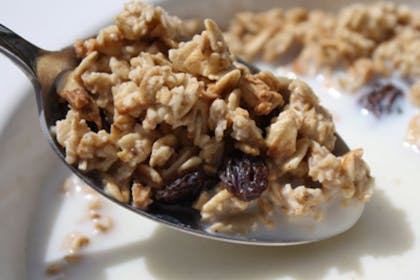Preparing to breastfeed
This page contains affiliate links, which means we may earn a small amount of money if a reader clicks through and makes a purchase. All our articles and reviews are written independently by the Netmums editorial team.
Preparing to breastfeed

Read all about breastfeeding

Reading up on the subject of breastfeeding will be one of the best ways you can prepare.
You'll find invaluable insights and tips from other Netmums when you visit the breastfeeding board of our friendly Coffeehouse forum, where you can also post questions of your own.
Or check out some of our articles on breastfeeding:
FREE NEWBORN NAPPIES
Breastfeeding tips
Your amazing changing breastmilk
Breastfeeding myths busted
You can also find information at breastfeeding organisations such as La Leche League, The Breastfeeding Network or the Association of Breastfeeding Mothers.
Attend antenatal classes

Antenatal classes – whether NHS or privately run – will give you loads of useful tips on labour and birth and caring for your baby; this includes breastfeeding.
There'll be a trained expert there to answer your questions, and they can also point you in the direction of the best support services in your area.

Buy your breastfeeding essentials

Technically, you don't need any special equipment to breastfeed your baby. But there are some things that can make life easier!
The biggest thing is a breast pump. This is great for enabling other people to feed your baby, so you don't have to be responsible for every night feed!
Another product that many mums find invaluable is nipple cream, which can help to prevent and treat cracked, sore nipples from breastfeeding.
We like Lansinoh's award-winning nipple cream. See more details here at Amazon.
There are also breastfeeding pillows that can make feeds more comfy, breast pads to protect against leaks, and even controversial nipple shields to offer extra protection against sore nipples.
Using reusable breast pads creates less waste and is better for the environment. See more details here at Boots.
You'll also want a long list of books, magazines and box sets to see you through the many hours of sitting and breastfeeding your baby, plus drinks and snacks.
Find local breastfeeding support

It's a great idea to find your local support organisations and pay them a visit during your pregnancy, rather than leaving it until your baby is born.
You can find a local breastfeeding counsellor (also known as a lactation consultant) by checking the Netmums local listings pages.
A breastfeeding counsellor will explain to you the importance of correct positioning at the breast, and describe how to encourage a good 'latch' to ensure good milk flow and to avoid sore, cracked nipples.
After the birth, they can help with any problems you may be experiencing.
Eat well in pregnancy and beyond

Get into the habit of eating a nutrient-rich diet, if you haven't done so already.
This will encourage good milk production, and will increase the quality of your breastmilk.
Your baby won't suffer if you are not eating well, but your own health will.
Just as in pregnancy, your body will prioritise your baby's needs above your own, so your newborn will sap every bit of good nutrition out of you, leaving you with low reserves unless you're eating healthily.
In particular, certain wholegrains (oats, cornmeal and barley), nuts (almonds), seeds (sesame, pumpkin and sunflower), and vegetables (mushrooms, lettuce, broccoli, asparagus and potatoes) are all thought to help boost milk supply.
Eat low GI foods

There are no hard and fast rules about specific foods you should be eating once you're breastfeeding, and there's no need to avoid anything in particular once your baby is born, either.
However, you may like to focus on eating foods that have a low glycaemic index, as they will keep you feeling fuller for longer rather than giving you a sugar rush followed by an energy slump.
Support your breasts

It's very important to support your breasts properly in pregnancy as well as during breastfeeding.
Towards the end of your third trimester, go and get professionally fitted for a couple of nursing bras.
There are several different nursing bra types, including those with zip cups and those with drop-down cups, which unclip from the straps.
Try operating each type one-handed and choose the one that feels simplest for you.
Keep comfortable at night

You can also buy sleep bras, which are made of soft cotton, for wearing in bed. Wearing one of these can make you feel more comfy at night, both in pregnancy and afterwards.
Know your breastfeeding rights

Firstly, breastfeeding in public is protected by law in the UK. That means that if you want to feed your baby in a public place, no one can stop you.
If a shop, cafe or other business tries to stop you breastfeeding or make you cover up, or even threatens to kick you out, that counts as discrimination, and you can make a formal complaint.
When it comes to work, unfortunately there's no law that says your employer has to give you time off to breastfeed. However, you do have the right to request flexible working.
Many employers will support pumping in the workplace though, by providing you with a place to pump and somewhere to store expressed milk.
If you're in doubt of your rights at work, speak to your HR manager.
More on breastfeeding

- To talk to other mums about how they prepared for breastfeeding, drop in to the Coffeehouse.
- Find out more helpful info and advice on feeding your baby
- Get local breastfeeding support
You may also want to bookmark our breastfeeding drop-in clinic. Trained breastfeeding experts are available every weekday evening to take your questions on everything breastfeeding-related.
Need advice?
Our health visitors and nursery nurses are on line Monday to Friday evenings to answer your queries on feeding, sleep and child health.
Whether you're pregnant already or trying to conceive, if you intend to breastfeed, there are things you can do to help prepare yourself for the experience.
This includes everything from reading up on breastfeeding for top tips, to finding local support groups, and keeping yourself as healthy as possible.
When it comes to breastfeeding, it's best to set yourself up for success from the start.
This means adopting a healthy diet before you're pregnant, although it's never too late to start!
Eating a healthy, nutrient-rich diet will not only encourage good milk production, but will also increase the quality of your breastmilk. Why not check out some of our healthy recipes for ideas?
Once you are breastfeeding, and before you begin, you should also try to focus on eating foods that have a low glycaemic index, as they will keep you feeling fuller for longer rather than giving you a sugar rush followed by an energy slump.
It's also important to support your breasts through pregnancy and breastfeeding with a decent nursing bra. It's best to get this fitted in your third trimester.
You can even get sleep bras which help support you overnight.
Above all, talk to fellow mums about their experiences, and don't be afraid to pay your local support organisations a visit. There's much to learn, including the importance of correct positioning at the breast, and how to encourage a good 'latch' to ensure good milk flow and to avoid sore, cracked nipples.
Remember, breastfeeding is a skill, and like any other skill, it can take time and perseverance for you and your baby to get the hang of it. But there are so many benefits for you and your baby, it's worth persevering if you can.
Check out the gallery above to discover our top tips...
Are you pregnant and hoping to breastfeed? Why not chat with other parents over on our forum about their experiences:





